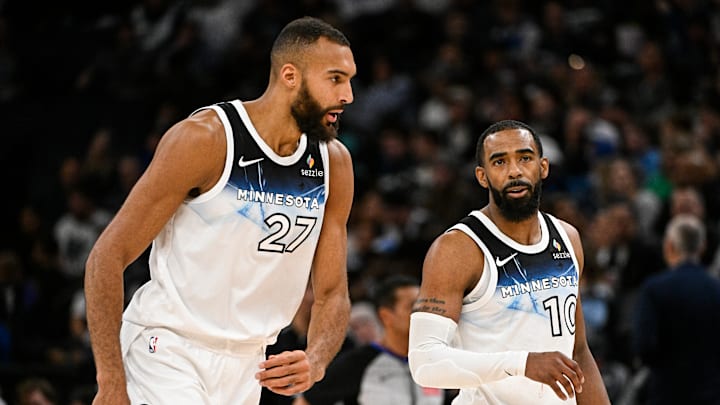The Minnesota Timberwolves face a tough decision with Mike Conley as they plan for the future. Despite his veteran leadership and steady presence, Conley’s age and recent production raise questions about his fit on a team aiming to stay relevant among the NBA’s elite. With his numbers slipping and Minnesota looking to develop younger players with more upside, it may be time to move on from Conley even with one year remaining on his current contract.
Mike Conley's 2024-25 production
Mike Conley wrapped up the 2024-25 regular season with averages of 8.2 points, 4.5 assists, and 2.6 rebounds over 71 games. He shot 40 percent from the field and 41 percent from three, but Conley’s scoring dropped to the lowest of his career. His free throw shooting was still elite at 90 percent and he contributed 1.1 steals per game.
In the playoffs, Conley’s role remained pretty much the same for Minnesota, but his impact faded under the bright lights. Conley averaged 6 points and 3.3 assists in about 24 minutes a night. In key games against Oklahoma City, his production shrank: he scored just three points in Game 2 and went scoreless in Game 5, playing 21 minutes. While Conley was still a factor defensively, his offensive punch was missing when the Wolves needed it most.
Age and attrition get everyone eventually
Across the NBA, players see a clear decline once they hit their mid-to-late 30s. Most guards start to lose quickness and lateral movement, with a steeper drop after age 35. Players like LeBron James and Stephen are outliers or exceptions that buck the trend with the majority of older players (any position) seeing reduced minutes, lower usage, and even fewer games.
Older players, such as Mike Conley, can struggle in the playoffs many times. As the intensity and pace increase, it can expose aging legs. Conley’s recent struggles are not an anomaly as this happens to many guards as they age and can’t create separation on offense. Even when they provide leadership, their ability to swing games with scoring or playmaking becomes limited.
Salary cap consideration
Minnesota has some sizeable contracts locked in for 2025, with Rudy Gobert and Anthony Edwards leading the way. This puts pressure on the front office to make every dollar count. Younger players on the team will also need to be paid if they haven’t already, so the Wolves need to keep flexibility for new signings or trades.
To stay competitive, the Wolves need room to adjust the roster. Veteran contracts, especially for aging guards with declining production, squeeze that flexibility. Even if Conley is under contract, the team may prefer to offload his salary to open a spot for younger, more dynamic talent or to sign a guard with great production and less mileage. One potential is already in-house in the form of Terrence Shannon Jr. who can score buckets at a high clip. He’s more of a two-guard but should see much more playing time next season.
Mike Conley’s value to the Wolves
There’s no denying Mike Conley’s leadership, defense, and playmaking still matter. He’s a calming force, a model teammate and his overall basketball IQ often helps cover for less-experienced players. But as his scoring and ability to break down defenses has faded. The Wolves are likely to focus on developing younger guards or finding a free agent who can push the pace and offer more upside offensively.
This Timberwolves team is built to compete now and every roster spot needs to deliver. Mike Conley’s best days are behind him and the numbers show it. Age, playoff struggles and balancing the salary cap all point to Minnesota looking elsewhere for production at the point. Fans should expect the Wolves to prioritize youth, keeping the franchise on track for another strong run in the West.
